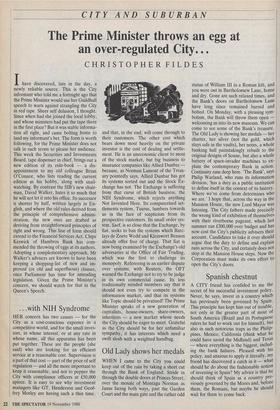. . .with NIH Syndrome
HER concern has two causes — for the City as a cost-conscious exporter in a competitive world, and for the small inves- tors, in whose interest, or at any rate in whose name, all this apparatus has been put together. These are the people (she said) who are looking for an efficient service at a reasonable cost. Supervision is a part of that cost — part of the price of self regulation — and all the more important to keep it reasonable, and not to pepper the City with compliance officers at £50,000 apiece. It is easy to see why investment managers like GT, Henderson and Geof- frey Morley are having such a thin time, and that, in the end, will come through to their customers. The other cost which bears down most heavily on the private investor is the cost of dealing and settle- ment. He is an uneconomic client to most of the stock market, but big business to insurance companies like Allied Dunbar because, as Norman Lamont of the Treas- ury pointedly says, Allied Dunbar has got its systems sorted out and the Stock Ex- change has not. The Exchange is suffering from that curse of British business, the NIH Syndrome, which rejects anything Not Invented Here. Its computerised set- tlements system, Taurus, lumbers towards us in the face of scepticism from its prospective customers. Its small order sys- tem, Saef, is so close that the Exchange, by fiat, seeks to ban the systems which Barc- lays de Zoete Wedd and Kleinwort Benson already offer free of charge. That fiat is now being examined by the Exchange's old adversaries at the Office of Fair Trading, which was the first to challenge its monopoly. Refereeing in an earlier dispute over systems, with Reuters, the OFT warned the Exchange not to try to be judge in its own commercial cause. Its less traditionally minded members say that it should not even try to compete in the information market, and that its systems like Topic should be privatised! The Prime Minister speaks of a new generation of capitalists, house-owners, share-owners, inheritors — a new market whose needs the City should be eager to meet. Grateful as the City should be for her unfamiliar sympathy, it has interests which need a swift slosh with a weighted handbag.






















































 Previous page
Previous page